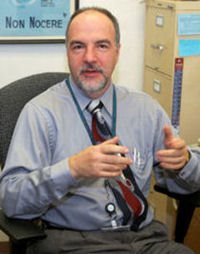Prologue
Former Secretary of HHS Mike Leavitt tells a story of when he was governor of the State of Utah. A research program to find the genetic cause for disease needed to recruit large families for the study. Gov. Leavitt met a grandfather who said "I think there's something to this genetics thing. I'm 71 years old, and when I turned 70, I was diagnosed as having macular degeneration. When my father was 70 years old, he got macular degeneration. In fact when his father turned 70 years old, he got macular degeneration."
He said, "If there's something I can do and my family can do to keep my grandson or my great grandson from having that moment when he turns 70 years old, I want to do it, and I'm in."
We hear many stories just like this. The older generation wants to know how they can help the younger generation prevent the healthcare problems that run in their family.
This grandfather’s family, in conjunction with other families, led to the discovery of the association of changes in the Complement factor H (or CFH) gene with this form of macular degeneration. Not only was the gene identified, but it led to the understanding that some forms of macular degeneration are inflammatory diseases, and anti-inflammatory treatments are now available to slow or halt progression of the disease.
My 23andMe report includes age-related macular degeneration as one of the 11 diseases in the clinical reports category. It tells me that when I’m 70 years old, my absolute risk will be 1.4%, compared with 2.4% in the general population.
Traveling to Grandmothers House - Where Are We Today?
Obviously, we want to tell patients to do a family health history and we want them to share it with their family members - and with their healthcare providers. But where are we today with this process? Are you tired of filling out the same family history form every time you visit a new doctor? Are doctors using the information effectively? Do they have the right electronic tools that can guide them to understand your risk, or for further evaluation, order the appropriate genetic test? Sadly, the answers to these questions are most likely not very positive.
The Feast Begins - Family History in the Electronic Health Record
Within Intermountain Healthcare, there are multiple forms (both computer and paper-based) collecting family health history information from many entry points into the healthcare system. The vast majority of family history is captured by the doctor in the medical computer – but in a text-based clinical note – which means the computer can’t understand it and do anything with it.
Except for those used by genetic counselors, most family history collection tools used today do not allow for the building of pedigrees, nor do they ask for other critical information, like the age of onset of a relative’s disease. Our current tools do not gather the data required to create a disease risk assessment for the patient. The Clinical Genetics Institute at Intermountain is beginning to rewrite these family history programs in the EHR.
The Main Course - What We Want to Create
As a group focusing on family health history, we’ve had a lot of time to ponder what we want to see in future electronic tools - tools that capture and analyze family health history information to advance clinical care. We would like to start with a general tool that collects information about the common diseases your primary care physician would be interested in. The program would then expand into more targeted areas to ask questions that a specialty physician would want to know about a specific disease or condition for which the patient is seeking treatment.
A key goal for this project is to provide useful risk assessment reports for both the patient and the doctor. First, the report should contain information for the patient to act on - information that will encourage behavior change, or to seek out appropriate screening tests, or possibly further genetic testing, and hopefully, sharing the results with other family members.
Secondly, the report should provide information for the doctor to review and validate for accuracy since the information will be stored in the EHR. When the data is stored in a structured and coded format, the computer can offer the doctor clinical decision support messages - which becomes powerful when clinical and genetic/genomic data are included in the decision algorithms. Having family health history records can guide the physician in ordering the most appropriate genetic test when testing is indicated.

© Intermountain Healthcare 2009. All rights reserved.
Pouring On the Gravy - New Tools for Patients
Microsoft HealthVault announced a grant program called the Be Well Fund in 2008. The Genetics Institute became one of 15 award recipients and began a project creating a web-based, patient-entered family health history program. When completed, the program will be hosted on Intermountain’s patient portal called ‘MyHealth’. The application will store the data in Intermountain’s clinical data repository, thereby making it available to healthcare providers via the electronic health record. If the user is interested in having a HealthVault account, they upload their data to that account by simply clicking a button. We hope to have this program go live in the Spring of 2010. In the spirit of the grant, we will attempt to make the code available via open source for others to implement.
A screen shot from our family history program under development

© Intermountain Healthcare 2009. All rights reserved.
Intermountain's MyHealth patient portal already includes a family health history page that offers two PDFs for download on family history questions. The first booklet guides the patient on how to collect family history information, and how to ask family members for their history and that of deceased relatives. The second booklet teaches more about genetics and how it may affect familial disease. These booklets are availabe for anyone to use from the Genetic Alliance, and are fully customizable for use with any group or organization.
Remember Your Table Manners - We Have Standards
The international healthcare data standards group HL7 has developed the Pedigree (Family History) model as a data transmission standard to exchange family history data between systems and applications. Besides becoming an HL7 standard, the model has become an American National Standard Institute (ANSI) standard, and is in the process of being approved by the International Standards Organization (ISO). Our patient-based family history tool, along with the tools mentioned in the following paragraph, is built around this standard. However, major healthcare software vendors have yet to implement the standard in their products, even though federal standards efforts like the Healthcare Information Technology Standards Panel (HITSP) and the Center for Certification of Healthcare Information Technology (CCHIT) will require them in the near future.
A diagram of the HL7 Pedigree (family history) model - click to enlarge

© Health Level Seven 2009. All rights reserved
Here Comes the Dessert - Other Great Family History Tools Freely Available
The Office of the Surgeon General in the United States encourages people to use its web-based family health history tool while families are gathered over the Thanksgiving holiday. But did you know that the Surgeon General’s My Family Health Portrait code is also openly available? And to practice what we preach, all of the US federal healthcare computer systems, which includes the Dept. of Defense for active military, the Veterans Administration for retired military, and Indian Health Service, will be basing their family history programs on the Surgeon General’s tool, especially adhering to all of the standards upon which it was built.
One of the most advanced clinical tools centered around family history is Hughes riskApps. This program identifies and manages women at high risk for hereditary breast/ovarian cancer, although they plan to expand it in the future to handle other cancers as well. The key components of the software are that it allows for patient-entered family history and other health data via a hand-held tablet. The information goes directly to the healthcare provider where several risk models are run to help determine the cancer risk of the patient. You can download the software for free from their website.
Saving the Leftovers - Warehousing Family History Data for Research
Having great family health history data collection tools is just the beginning in reaching our goals in this area. Using the data to explore clinical research questions will open up other opportunities, which will lead to genetic/genomic - or dare I say – personalized medicine discoveries.
A diagram of a family history datamart - click to enlarge

© Intermountain Healthcare 2009. All rights reserved.
Time to be Thankful
When your belly is full, your family is around you, and everybody is healthy, it is certainly time to be grateful. I would wish that everybody could enjoy those blessings. To add to my abundant portion, I must also mention what a wonderful opportunity it is to work in healthcare IT, and more specifically, to work in the emerging and exciting field of clinical genomics and personalized medicine. My list of things to be thankful for is much longer, but to not stop you from getting that second slice of pumpkin pie, let me just say to everyone a Happy Thanksgiving, and may your plate be filled with a healthy family history.

This picture was taken in 2008 for my parents 50th wedding anniversary. Grandma would not be pleased if I didn't point out that, since the photo was taken, two granddaughters and one more great-grandson have been born.














What a delightful blog. Thanks for weaving it all into Thanksgiving. And have a great dinner on that day.
ReplyDeleteJoyce Mitchell
Grant - thanks very much - I really am enjoying you and Marc's comments overall - this one was great, loved the family photo and the matching branches of the family ties and dresses!
ReplyDeleteThat’s really amazing and extraordinary blogs & can help those who get issues in searching this type of information.
ReplyDeletehttp://carehomessurrey.wix.com/carehomessurrey
I constantly emailed this site post page to all my friends, because if prefer to read it then my all friends will too.oil pulling side effects
ReplyDeleteI agree. You have made the nice blogs with the great info in the contents.thewellingtonmedicalcentre.com/
ReplyDeleteHaving great family health history data collection tools, now we understand about our ancestors.http://pregnancymiraclebookss.com/
ReplyDeleteThe people are very lucky to have this blog because it has better knowledge.Marvin Mcmillan
ReplyDeletevitamin D is primarily made in our bodies as a result of getting adequate sunlight. rheumatoid arthritis treatment
ReplyDeleteAwesome your blog thanks for your post
ReplyDeletewelcome to our Standard Essential oils where several products listed for best caring and health uses as skin, massage and acne benefits. We deals in this area direct to our special friends thanks
ReplyDeleteBlog yayınlarınızı son bir saat içerisinde okudum. Bu en iyi blog. En İyi Posta Çağrı Merkezi
ReplyDeleteThis is my very first time that I am visiting here and I’m truly pleasurable to see everything at one place. Healthy Snacks For Kids
ReplyDeleteI must admit ( ( Robinson.buckler (@) Yahoo. com ) ) is really a genuine man when it comes to getting an ex back………………………………………………..
ReplyDeleteyeezy 700
ReplyDeletelebron shoes
jordan retro
yeezy wave runner 700
kd 12
golden goose
off-white
cheap jordans
balenciaga speed
yeezy
bape outlet
ReplyDeletebape shoes
golden goose
kd 12
off white clothingoutlet
palm angels hoodie
a bathing ape
supreme new york
yeezy shoes
jordan shoes